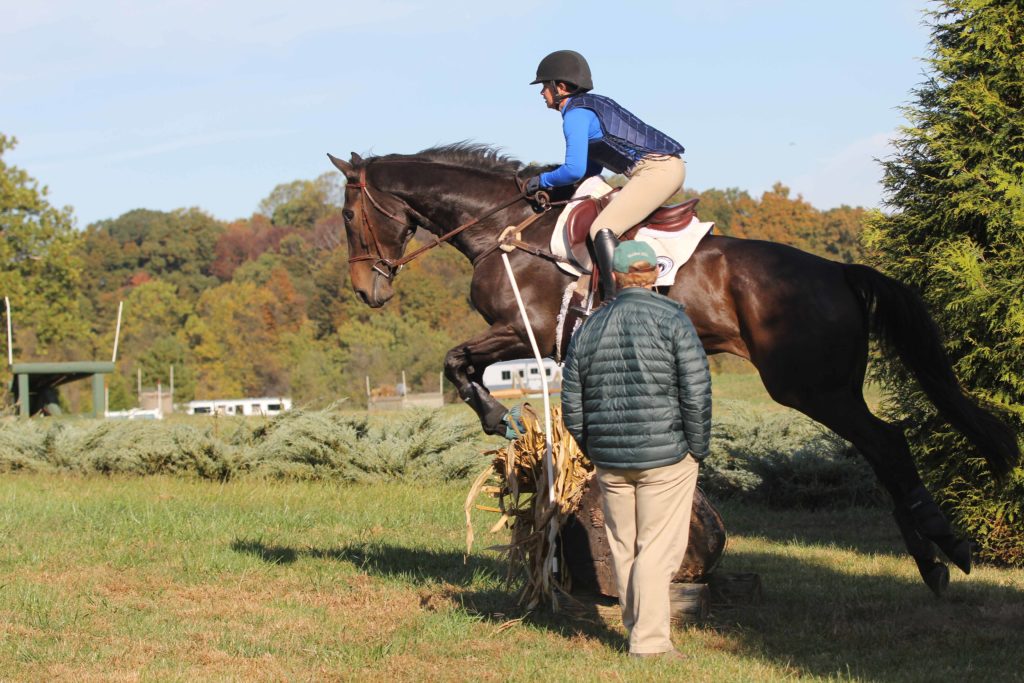As a trainer who deals mainly with adult riders, I spend just as much time talking about fear and anxiety as I do about the correct use of our position and aids. It’s a topic that I’ve researched online and learned about first hand from my students. While it’s something that most riders deal with, it’s something that most riders don’t want to admit they struggle with. However, discussing and understanding our fear is the only way we can rise above it.
I’m 1/3 of the brain power behind the clinic series Position Matters. Auditors and participants are familiar with the concept that your fear is well founded. That may be surprising to some, as we all know that fear isn’t always rational (my fear of snakes sure isn’t). However, much of our anxiety in the saddle is perpetuated by a weakness or imbalance in our position that is sending a signal to our brain, saying we aren’t secure — and that IS rational. Anxious about jumping down a bank? Anxious about mounting? There is a weakness in your position that makes those activities difficult, therefore making you nervous. That is the very first step to understand and then conquer your fears.
 A step to conquering fears: Get an exceptional coach who understands that fear is real. Photo by Beth Takacs.
A step to conquering fears: Get an exceptional coach who understands that fear is real. Photo by Beth Takacs.
Another largely glossed over aspect is who you are as a person. The person you are greatly affects the rider you will be. Do you suffer from anxiety in your daily life? Are you hyperactive and tense? Have a hard time sitting still and focusing? The things that make us who we are do not suddenly vanish once we climb into the tack. If you struggle with anxiety in your everyday activities, you most definitely well in the saddle. I’ve heard a lot of adults say “I never used to be this afraid” or “I wasn’t always this anxious.” Those are valid feelings, but it’s important to remember all the life you’ve lived since you rode and weren’t anxious. The kids you had raised, the horses you’ve fallen off, the bad trainers you’ve encountered, and all the bad things you’ve witnessed on the news has created a new person from the one you were at 18. While horses are therapeutic, there is no magical potion that will let you forget your past just because you’re in the tack. The riders who become consumed with their old selves are the ones who start to feel ashamed by their fear. They start to believe that somehow their nerves make them less of a rider. Your life experiences that have molded the person you’ve become, aren’t shameful, and don’t suddenly become so just because you’re riding. However, if you let shame define you, you will never conquer that fear.
Which leads us to owning your fear. If you were sitting in a therapist’s office, they would tell you that you can’t move past an emotion until you process and accept that emotion. Feeling fear is neither abnormal nor a sign of weakness. Internalizing that fear and then becoming ashamed of it makes it impossible to process and then harness. The more scared you feel, the scarier things will seem. Potentiation is the process where your fear response is amplified if you are already in a state of fear. There’s something empowering about accepting how you feel and then rising above it. Adult riders are always so surprised when I tell them that their fears are not unique. Fear of falling, spooking, and riding outside are all common things that riders struggle with. Your fear may make you feel like the oddity, but feeling fear is just as normal as breathing.
So now that I understand my fear, how do I harness it? You always want to start with a knowledgeable trainer. One who understands fear is a real thing and teaches you where that fear lies within you. I have a student who’s nervous about getting on. It has nothing to do with the horse. It has everything to do with the weakness in her quad, making it difficult to trust that she can stand up in that stirrup to climb on. So, her homework is to rest her left foot on something and practice stepping up and down. If she can’t pull her body weight up onto a box, of course doing that same motion on an animal would elicit fear. Understanding the weaknesses in our position is key to defeating our fear. Accepting that if you are an anxious person the 164 hours out of a week that you aren’t on a horse, you are very susceptible to being anxious the four hours out of a week ON a horse? Know that fear in the saddle is not anything to be ashamed of. You are not alone, and it can get better with the right help!
